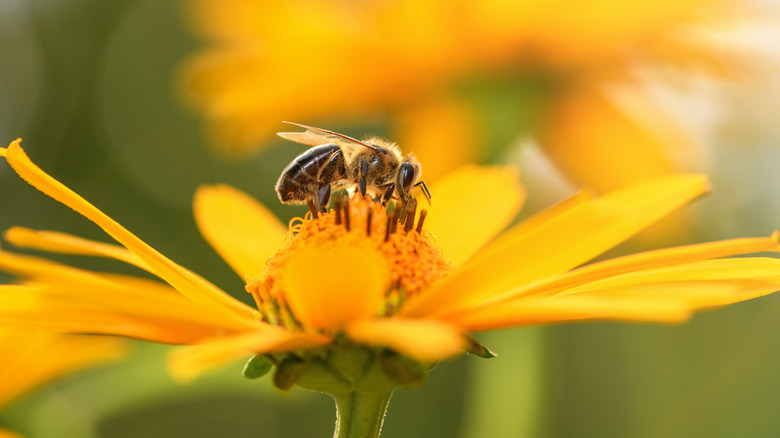What Happens To Your Body When You Accidentally Swallow A Bug
Whether you're riding a bike or swimming outdoors, more than likely a bug has wound up in your mouth. Before you knew it, you swallowed it. Your friends might offer you some consolation by saying, "It's protein." Although eating an insect seems gross, people throughout history have consumed insects as food, according to the Smithsonian. Locusts are boiled and salted in some African cultures, and termites are lightly fried before they're sold in markets in the Democratic Republic of Congo. And yes, bugs are a source of protein for some cultures.
Is it safe to swallow bugs? According to microbiologist Dr. Bobbi Pritt at the Mayo Clinic, it depends. Accidentally eating bugs like spiders, flies, or bed bugs (gross!) might not be savory, but they are typically digested through your system like food. However, swallowing some bugs might cause problems for your body if the bugs sting or carry bacteria.
If the bugs sting or bite
Pritt said that swallowing bugs like bees, fire ants, or caterpillars can be painful, especially if the insect stings you in your mouth before you swallow it. People who are allergic to insects such as bees might have problems if they accidentally swallow them. They could experience dizziness, difficulty breathing, or swelling. Severe cases could end in cardiac arrest.
In 2021, a cyclist died in Spain after swallowing a bee, according to Road.cc. He had been riding with a group near a sustainable agriculture farm when he suffered cardiac arrest. A professional rower died in early March when he suffered an allergic reaction from swallowing a bee during a bike ride, according to the Mirror. Although he didn't die at the scene, he died three weeks later from complications that would leave him brain-dead. Swallowing a bee isn't always fatal, though. A Canadian politician accidentally swallowed a bee while holding a press conference in 2022. Although he choked at first, he swallowed some water and continued with his press conference (via Global News). According to HealthTap, the bee will probably die in your stomach if you swallow it.
Although some caterpillars can be eaten, caterpillars that have vibrant, colorful patterns could be poisonous. Caterpillars with hairs or spines should also be avoided, according to Survival Sullivan.
Some bugs transmit disease and bacteria
Cockroaches are not only gross, but they spread diseases through their saliva, vomit, and feces (via Ehrlich Pest Control). Their feces and body parts can trigger allergies and asthma when inhaled through the dust in an infested home. The pesky housefly has traveled to many disgusting places before landing on your food. According to PennState Extension, flies can carry as many as 65 diseases, such as typhoid fever, dysentery, and cholera. Pritt says that flies can also carry the Shigella bacteria, which can cause diarrhea if you swallow one.
You'll also want to ensure your home is free from fleas because accidentally swallowing a flea might have you ingesting the double-pored dog tapeworm. If a beetle drops into your margarita, be sure to pick it out. Beetles can carry the dwarf tapeworm. According to Geisinger, a fever might indicate an infection from swallowing a bug. Your immune system should tackle the infection in a few days.



